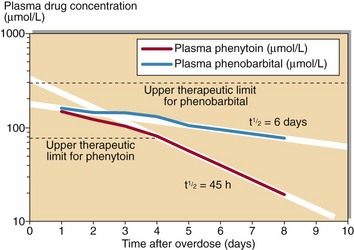60 In a few specific poisonings additional biochemical tests may be of value (Table 60.1). Table 60.1 Toxins for which biochemical tests are potentially useful Usually knowledge of the plasma concentration of a toxin will not alter the treatment of the patient. Toxins for which measurement is useful include carbon monoxide, iron, lithium, paracetamol, paraquat, phenobarbital, phenytoin, quinine, salicylate and theophylline. Quantitative analysis will give an indication of the severity of the poisoning and serial analyses provide a guide to the length of time that will elapse before the effects begin to resolve (Fig 60.1).
Toxicology
Toxin
Additional biochemical tests
Amphetamine and Ecstasy
Creatine kinase, AST
Carbon monoxide
Carboxyhaemoglobin
Cocaine
Creatine kinase, potassium
Digoxin/cardiac glycosides
Potassium
Ethylene glycol
Serum osmolality, calcium
Fluoride
Calcium and magnesium
Insulin
Glucose, c-peptide
Iron
Iron, glucose
Lead (chronic)
Lead, zinc protoporphyrin
Organophosphates
Cholinesterase
Dapsone/oxidizing agents
Methaemoglobin
Paracetamol
Paracetamol
Salicylate
Salicylate
Theophylline
Glucose
Warfarin
INR (prothrombin time)
Measurement of drug levels
Basicmedical Key
Fastest Basicmedical Insight Engine











